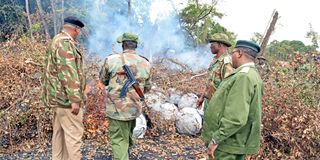Premium
Two years later, ban on charcoal does little to save our forests

Forestry officials and conservators look on as confiscated charcoal is destroyed in Narok County during a crackdown. Up to 82 percent of urban and 34 percent of rural households use charcoal for cooking.
What you need to know:
- A multi-agency team that has been studying the effects of the moratorium is expected to release its report this month.
- The price of a 90kg bag has risen from Sh500 to Sh3,000. The 2kg tin price has doubled from Sh50 to Sh100.
- People who lost their jobs because of the Covid-19 economic shut down have also turned to charcoal for a living.
- Up to 82 per cent of urban and 34 per cent of rural households use charcoal for cooking. The Sh42 billion a year sector supports more than a million people.
Two years after Kenya declared a moratorium on charcoal trade, questions arise as to whether the ban is achieving its purpose of protecting public forests.
A multi-agency team that has been studying the effects of the moratorium is expected to release its report this month.
Although the ban only applied to public forests, its enforcement has affected private individuals who grow trees for charcoal.
Long-term, this could have adverse effects on tree planting in private spaces yet this plays a big role in afforestation.
Neither does the moratorium seem to be helping public forests. Charcoal production has not stopped despite the government crackdown which has seen scores of people arrested, charged and fined.
Instead, the product has become more expensive for consumers. Only vendors and transporters are smiling.
The price of a 90kg bag has risen from Sh500 to Sh3,000. The 2kg tin price has doubled from Sh50 to Sh100.
Up to 63 per cent of the total profit in the charcoal value chain goes to vendors with wood and charcoal producers enjoying only 24 per cent, according to a study commissioned by the Ministry of Environment.
Nairobi is the biggest market
Interviews with police, county commissioners, Kenya Forest Service and conservationists reveal what one expert describes as a “full-blown” disaster of cutting down trees for charcoal. The Covid-19 pandemic has worsened the situation.
“Illegal loggers are taking advantage of the fact that police have been redeployed to enforce Covid-19 rules,” says Beatrice Gachago, Kajiado County police commander.
People who lost their jobs because of the Covid-19 economic shut down have also turned to charcoal for a living.
Nairobi is the biggest market, so forests near it are most affected. Mau and Ngong forests, Kitui South Game Reserve and Tsavo National Park, community land and private farms are suffering massive destruction.
In Kona Baridi, Kajiado North, Douglas D’Costa, a conservationist who has lived there since 1996 is battling to save trees on his farm.
“They (illegal loggers) argue it is their only source of livelihood. They are prepared to use violence,” says D’Costa.
His farm slopes down to a ravine through which a river flows. Not long ago, both sides of the ravine were heavily forested with acacia trees. Not any longer.
From his home, he watches as trees are felled almost daily across the valley, recording the destruction on camera.
Three-pronged approach
This week, he sent me a picture of a kiln on the riverbank with the caption, “Cut down this morning”. The photos showed smoke billowing from other kilns in the background.
Joseph Macharia, the county Kenya Forestry Service officer, says regular anti-logging patrols are carried out. “But dealers have their own ways of dodging our officers.’’
His Narok counterpart, Muraguri Mwai, says the 20,000ha community-owned Nyakweri and the expansive Mau forests are threatened.
Nyakweri is regarded as the maternity of elephants because it is here that the jumbos give birth. Before the moratorium, up to 10,000 bags of charcoal were produced in Nyakweri annually.
At the Coast, Francis Kagema of Nature Kenya, says Dakacha forest in Kilifi is the hub of illegal charcoal production.
“It’s a full-blown disaster. Tonnes of charcoal leave every day, mainly on boda bodas.”
“It’s difficult to completely eradicate charcoal burning because of the number of Kenyans who depend on it,’’ says Nellie Oduor, director of Kefri’s National Forest Products Research Programme.
Up to 82 per cent of urban and 34 per cent of rural households use charcoal for cooking. The Sh42 billion a year sector supports more than a million people.
One solution is policy that is anchored around a three-pronged approach: Planting trees, producing and using charcoal sustainably and efficiently. How to achieve this is the subject of my next column.




